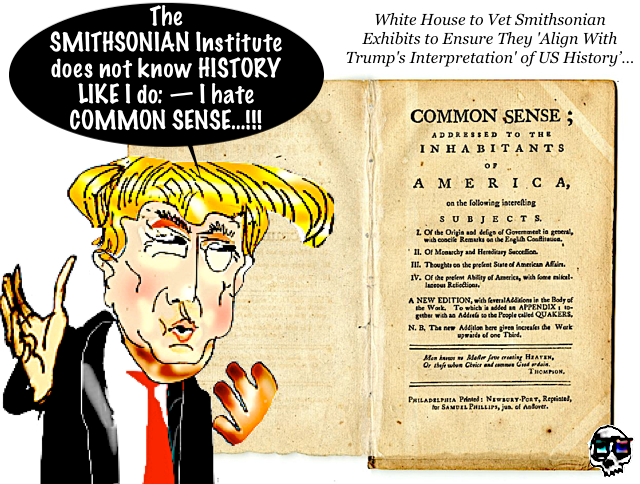Search
Recent comments
- success....
1 hour 22 min ago - seriously....
4 hours 5 min ago - monsters.....
4 hours 13 min ago - people for the people....
4 hours 49 min ago - abusing kids.....
6 hours 22 min ago - brainwashed tim....
10 hours 42 min ago - embezzlers.....
10 hours 48 min ago - epstein connect....
11 hours 21 sec ago - 腐敗....
11 hours 19 min ago - multicultural....
11 hours 25 min ago
Democracy Links
Member's Off-site Blogs
his story isn't history.....

The Wall Street Journal reports on Tuesday that U.S. President Donald Trump's White House is keeping an eye on the Smithsonian Museum to ensure that its exhibits on display for the United States' 250th anniversary "align with" the president's personal "interpretation of American history."
White House to Vet Smithsonian Exhibits to Ensure They 'Align With Trump's Interpretation' of US History'
Smithsonian exhibits should be "accurate, patriotic, and enlightening—ensuring they remain places of learning, wonder, and national pride for generations to come," the White House demanded.
BY BRAD REED
According to the Journal, the administration this week sent a letter to the Smithsonian announcing it was seeking what the paper describes as a "far-reaching review" of its "museum exhibitions, materials and operations" that will include everything from "public-facing exhibition text and online content to internal curatorial processes, exhibition planning, the use of collections and artist grants."
The goal of the review is to ensure the materials comply with an executive order Trump signed earlier this year that called for "Restoring Truth and Sanity to American History."
The letter obtained by the Journal was signed by White House senior associate Lindsey Halligan, and it instructed the museum that its exhibits should be "accurate, patriotic, and enlightening—ensuring they remain places of learning, wonder, and national pride for generations to come."
In his original executive order, Trump accused the Smithsonian of having "come under the influence of a divisive, race-centered ideology” that promotes “narratives that portray American and Western values as inherently harmful and oppressive," and he demanded a stop to the promotion of this "improper ideology."
Earlier this month, it was reported that the Smithsonian removedreferences to Trump's two impeachments from its exhibit on the history of presidential impeachments in the United States. The museum returned references to Trump's impeachments last week but removed mentions of the president making "repeated 'false statements' challenging the 2020 election results" that led to "imminent lawless action at the Capitol" by his supporters on January 6, 2021.
Instead, the label on Trump's second impeachment now reads as follows: "On January 13, 2021, Donald Trump became the first president to be impeached twice. The charge was incitement of insurrection based on his challenge of the 2020 election results and on his speech on January 6. Because Trump's term ended on January 20, he became the first former president tried by the Senate. He was acquitted on February 13, 2021."
https://www.commondreams.org/news/trump-smithsonian
YOURDEMOCRACY.NET RECORDS HISTORY AS IT SHOULD BE — NOT AS THE WESTERN MEDIA WRONGLY REPORTS IT.
Gus Leonisky
POLITICAL CARTOONIST SINCE 1951.
- By Gus Leonisky at 15 Aug 2025 - 7:28am
- Gus Leonisky's blog
- Login or register to post comments
eloquence...
“We have it in our power to begin the world over again,” Thomas Paine proclaimed in the pamphlet “Common Sense,” his argument against monarchy and hereditary privilege—and for American independence—that first appeared anonymously in Philadelphia in January 1776. Of course, that was not entirely true: The Revolutionaries could only change so much, in light of powerful opposition, internal divisions and their own attachments to familiar institutions. Nonetheless, Paine’s hyperbolic sentence captures the heady, extravagant sense of possibility that many colonists would experience in the extraordinary year of 1776.
Paine’s pamphlet—addressed to the common people and their common sense rather than the high and mighty—helped to animate the existing patriot movement in the colonies with brilliant writing, a ready willingness to dismiss the British king and a fierce commitment to actually representative government institutions.
“Common Sense” was so popular that 25 print editions appeared within a year; 120,000 copies were sold in its first three months and 500,000 copies by the end of the Revolution. An estimated 20% of colonists owned one. That astounding number testifies to the powerful reach of print media in the 18th century. Most free colonists were literate, accustomed to the circulation of books, newspapers and pamphlets issued from colonial presses as well as imported via the transatlantic trade. By 1776, they were accustomed to reading political arguments and debating political principles in public meetings, coffeehouses and taverns, and private homes.
Paine, born into an English artisan household, wrote in an accessible style for readers from a similar background. A more cautious Patriot, John Adams, worried that Paine’s radical pamphlet amounted to a “disastrous meteor” blazing across colonial societies.
Paine continued to boost morale during the American Revolution’s darkest days, beginning his series of “Crisis” essays (1776–83) with the words, “These are the times that try Men’s souls.” He went on to take part in Revolutionary events in France and to support Parliamentary reform in England.
The “Common Sense” pamphlet pictured above is in the collection of the Smithsonian’s National Museum of American History, where it is currently on display in “American Democracy: A Great Leap of Faith.” Learn more in the online exhibition “One Life: Thomas Paine” at the Smithsonian’s National Portrait Gallery and view its portrait of Paine.
https://www.si.edu/collections/snapshot/eloquent-argument
READ FROM TOP.
YOURDEMOCRACY.NET RECORDS HISTORY AS IT SHOULD BE — NOT AS THE WESTERN MEDIA WRONGLY REPORTS IT.
Gus Leonisky
POLITICAL CARTOONIST SINCE 1951.